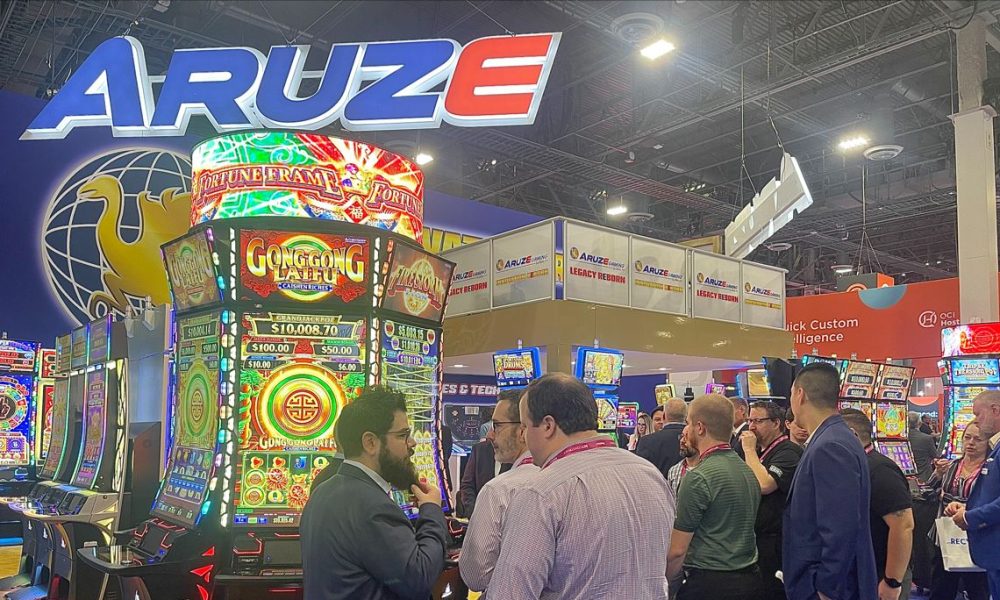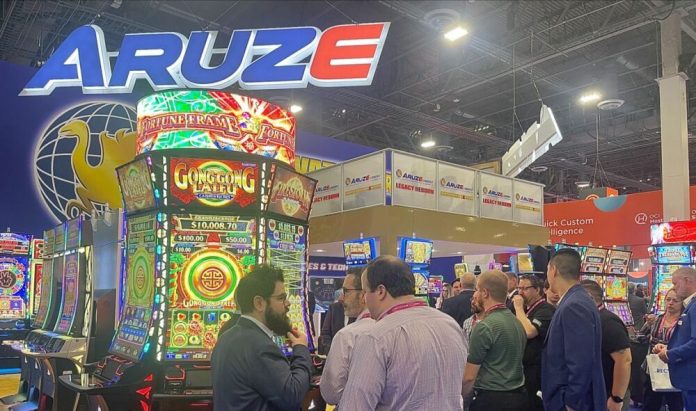Sunday, July 27, 2025 11:28 AM

Aruze Gaming Global made its pitch to Nevada regulators for an unlimited gaming license, but the Gaming Commission instead opted for a license limited to five years, citing concerns about a pending federal lawsuit and the state of the company’s finances as it seeks to become profitable after losing millions of dollars since 2022.
Aruze, a maker of slot machines and related gaming equipment also known as AG2, whose parent Empire Technological Group obtained Aruze assets out of bankruptcy in 2023, will have to return to the Gaming Control Board and Commission by July 2030 to have its Nevada license renewed.
Despite the case made by Aruze attorney Scott Scherer and company executives that the slot maker has a bright future and that a limited license would make it more difficult to obtain the financing it’s seeking to grow the business, the vote Thursday was 4-1 in favor of the five-year limitation with one commissioner opposed to granting the license altogether.
The five-year license follows the Commission granting Empire Technological Group a two-year limited license in 2023. The same five-year restriction also applies to Aruze President Linyi (Frank) Feng and Director Tiehui Qiu.
Aruze continued to face questions about its funding history and ties to Hong Kong-based Paradise Entertainment Limited and its subsidiaries led by controlling shareholder Jay Chun, Feng’s brother-in-law. Feng has contended he is the controlling owner of Aruze and that Chun hasn’t funded Empire.
In a federal court case, Paradise has claimed copyright violations and that it has an exclusive arrangement with Empire. Empire argued that since Paradise has no ownership claim, Empire wasn’t required to seek Paradise’s approval to purchase assets of the Aruze, which filed for bankruptcy in February 2023.
Commission member Rosa Solis-Rainey, who was the only one to vote against the license, said she still doesn’t understand the separation of the companies and cited issues raised in the lawsuit. She said she also had questions about Aruze’s past source of funds possibly obtained from Chun.
“I have been concerned about what’s been possibly misrepresented to us, and that’s always been the reason for my discomfort,” Solis-Rainey said. “He may have paid that back, but he still misrepresented where that came from when asked a direct question. I don’t think the applicant before us has been completely forthright with us.”
In voting against the licensing, Solis-Rainey said it’s not a reflection on company employees who she added have been doing great work.
Commission member Abbi Silver, a former Nevada Supreme Court judge, said she has gone through the federal lawsuit and wants to see it play out in court and see what facts emerge about financing from brother-in-law.
“There are serious allegations in this federal complaint,” Silver said. “If they are true, than to me Mr. Feng is not suitable, at least not in my opinion. If they are not true, then this is an exercise in futility. It’s hard for us to make that determination based on allegations in a federal complaint. It’s not something I can tell who is right and who is wrong unless discovery bears it out. That’s why a five-year limitation is appropriate with the case because you can’t tell what’s going on. I’m less concerned about whether he is going to make it financially versus all of the allegations in the federal suit.”
Aruze attorney Scherer responded that Paradise dropped any contention in the lawsuit that it owned Empire, and if Paradise did claim that, then it misrepresented the case to its shareholders on the Hong Kong stock exchange when it filed its related-party notifications.
“They can’t have it both ways,” Scherer said in trying to clear up that issue.
Silver said she’s not concerned about that, but that Feng is alleged to have taken employees and trade secrets from his brother-in-law to set up Empire.
“I am concerned about Mr. Feng’s actions as alleged in the federal complaint as usurping and taking over and using his position as president of his brother-in-law’s company as a direct competitor. That’s what I am worried about,” Silver said.
Scherer said wild accusations raised by the lawsuit but “the vast majority of accusations have no basis in fact.”
The company has discussed raising $30 million for daily operations and for investing in future research and development. It is seeking to finalize that by the end of the year.
Commission member Brian Krolicki said he has concerns as well but that a five-year license gives the company time to raise the funds it needs to execute its plan.
“I don’t know how burdensome that five-year restriction is when it comes to fundraising,” Krolicki said. “You are a good company. You’ve hired 300 people and 80 of them work here. You’re in dozens of countries and sold thousands of units. That’s all a great story, and I want to help you and encourage you… But our responsibility is to make sure our licensees are in a good place.
Feng, who said he’s willing to sell his real estate holdings and put those funds into the business, said the business is growing rapidly, and two years ago its revenues were $16 million to $18 million. In 2024, it achieved $50 million in revenue in the first year it ran as Aruze Gaming Global and that he expected a 50% increase this year.
“Over the next couple of years this company will be very successful and be a very proud Nevada company in the industry,” Feng said.
Empire is licensed in more than 150 jurisdictions and has placed more than 500 units in more than 50 casinos in Nevada. Empire is responsible for 2,400 units in Nevada alone, including those previously placed by Aruze Gaming America.
Empire has about 350 employees globally.



